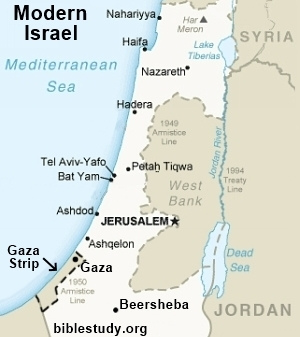The Lord, as part of his unconditional and unbreakable covenant he made with Abraham, promised in 1875 B.C. that his descendants (Israel) would inherit territory that would stretch from "the river of Egypt to the great river, the river Euphrates" (Genesis 15:18).
Israel, under both Moses and Joshua, fought many wars to claim a large portion of the promised territory (see our series on Biblical Wars). The Lord, however, in spite of the many victories, informed Joshua before he died that "there remains yet very much land to be possessed" (Joshua 13:1).
Unconquerable enemy
Part of the area that needed to be conquered and populated, allocated to the tribes of Judah and Dan (Joshua 15:45 - 47, 19:43, 21:23), was occupied by the warrior nation of the Philistines. Their greatest cities were Gaza, Ashkelon, Ashdod, Gath and Ekron (1Samuel 6:17). They also lived in villages like Gerar (Genesis 26:1) and Gibbethon (1Kings 15:27). They are a prime example of territory Israelites never incorporated into their kingdom.
Shortly after Joshua's death the tribe of Judah did take the cities of Gaza, Askelon and Ekron (Judges 1:18) but were unable to drive the people completely out (verse 19). The Philistines quickly recovered, however, and took back control (Judges 3:3).
Interestingly, at this time God seems to have changed his will regarding how soon Israel was allowed to possess certain already allocated territories. He chose, instead of continuing to have his people displace and repopulate certain areas (like under Moses and Joshua), to allow certain groups to live within the Promised Land. These groups, such as the Philistines, were left to test (prove) his chosen nation (Judges 3:1 - 3).
The height of power
The height of power and prestige as a nation took place during the reigns of David and Solomon (1010 - 930 B.C.). David had to fight against the Philistines multiple times before He finally rendered them too weak to pose an immediate threat (2Samuel 8:1). He never, however, incorporated their land into the Kingdom of Israel.
David's reign was surpassed in glory, riches and honor by his son (1Chronicles 29:25). While the below verse seems to indicate that Solomon was finally able to possess all the land promised to Israel, a closer study shows otherwise.
Solomon ruled over all the kingdoms from the Euphrates River to the land of the Philistines and as far as the border of Egypt. They offered tribute and served Solomon all the days of his life (1Kings 4:21, HCSB).
Note that 1Kings 4:21 states that Solomon dominated KINGDOMS, which presupposes they still existed as separate entities apart from Israel! As vassal states and unconquered peoples (1Kings 9:20 - 21) they paid him tribute (gold, silver, etc.) in recognition of his unparalleled wisdom (1Kings 4:30 - 31, 10:23). They were not, however, territories annexed by Solomon.
". . . for not all this territory was incorporated into the geographic boundaries of Israel; many of the subjected kingdoms retained their identity and territory but paid taxes (tribute) to Solomon" (Bible Knowledge Commentary on 1Kings 4:21).
The Philistines continued to dwell within the Promised Land for many years after Israel split. For example, in c. 843 B.C. they invaded the Kingdom of Judah. They not only entered Jerusalem but also looted the palace and took King Jehoram's family captive (2Chronicles 21:16 - 19). During King Ahaz's reign (735 to 715), they attacked Judah's southern border, took several cities, and repopulated them with their own people (2Chronicles 28:18).

Conclusion
Israel never settled and incorporated into its geographic boundaries all the land promised by God. Large tracts such as the territories northeast of the Sea of Galilee to the Euphrates River, and the area populated by the Philistines, were never completely ruled over or considered a part of the kingdom.
Even today, the modern nation of Israel does not fully possess and populate all the Promised Land. An area named after the still existing city of Gaza, known as the Gaza Strip (see above map), although controlled by the Jews, is populated almost entirely by non-Jews (Palestinians).
God will soon fulfill his unbreakable promise to Abraham in the first resurrection. When Jesus returns to the earth, he will resurrect all the righteous saints including King David. He will then gather the remnant of Israel still alive in the End Time and place them in the Promised Land where David will rule them (Jeremiah 30:9 - 10, Ezekiel 34:23 - 24, 37:21 - 26).